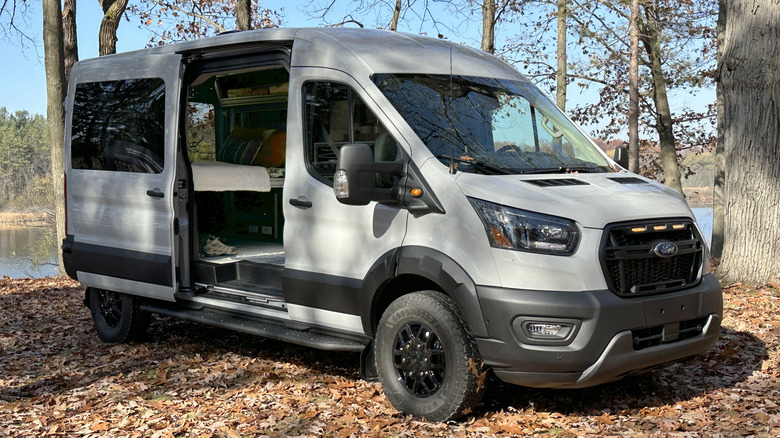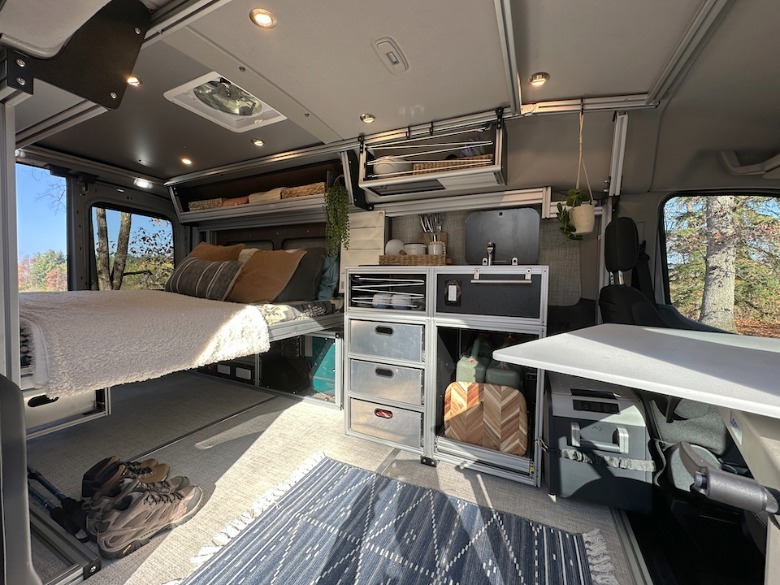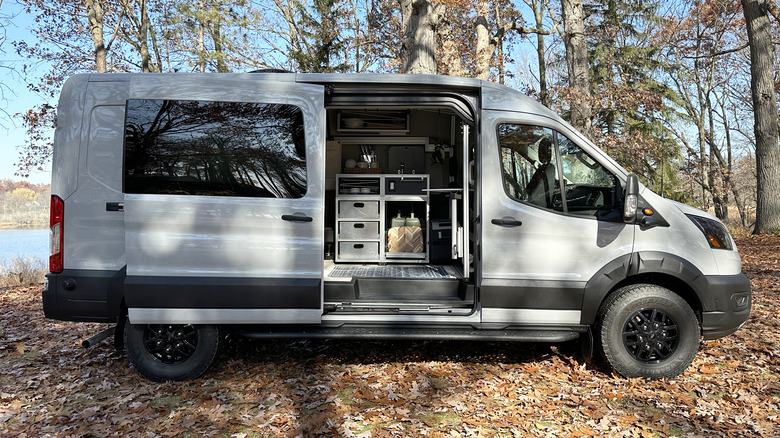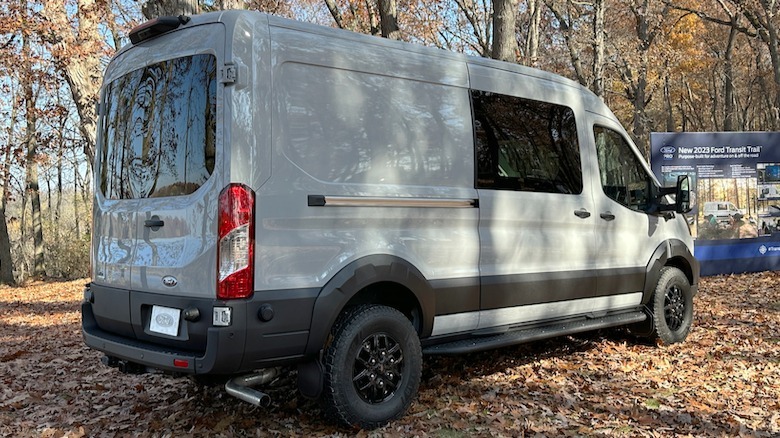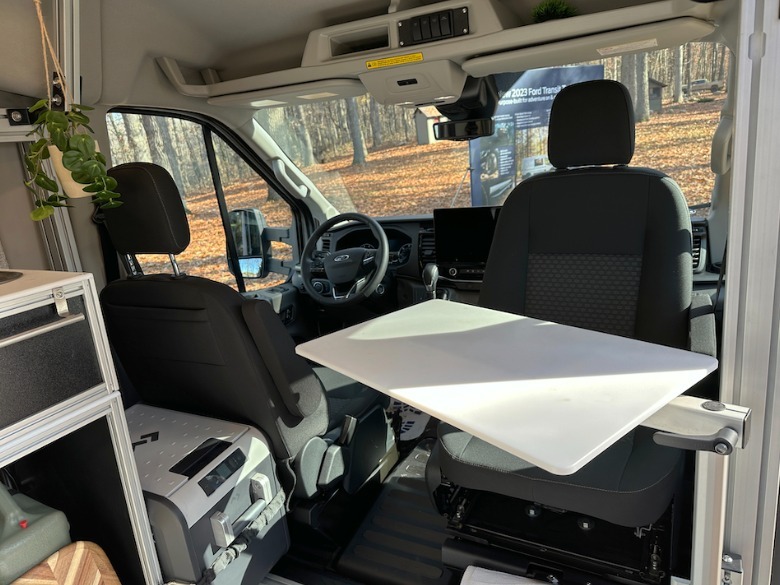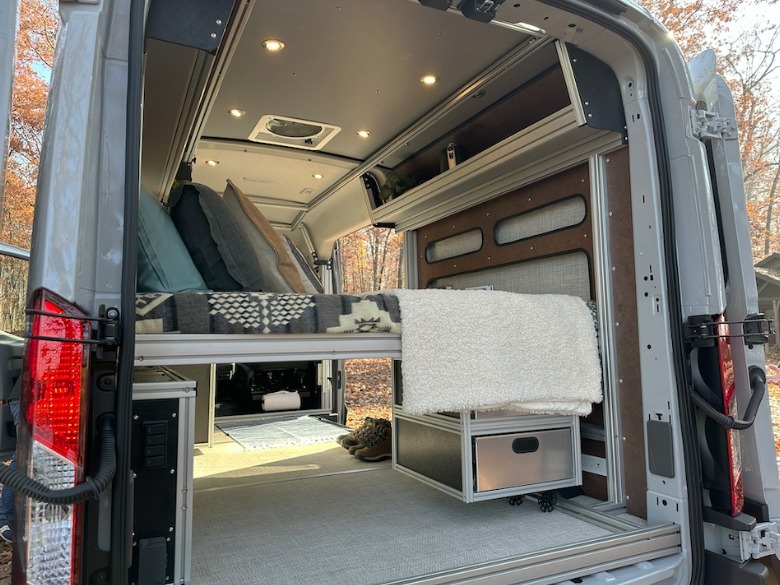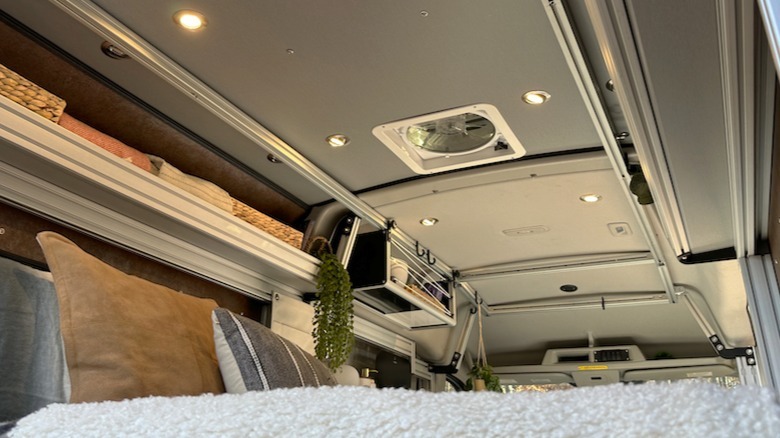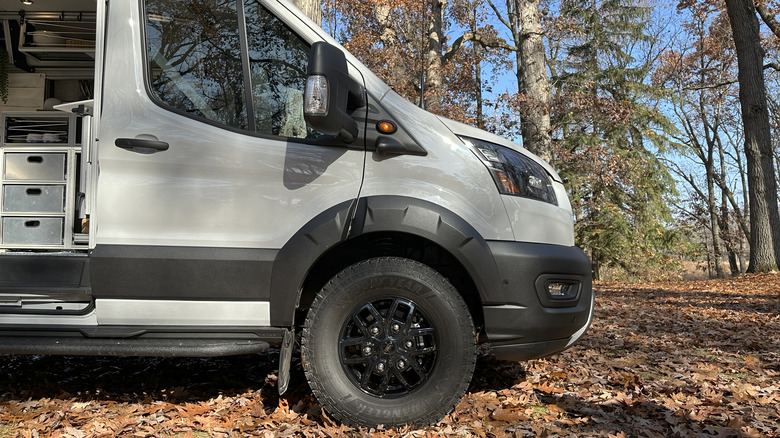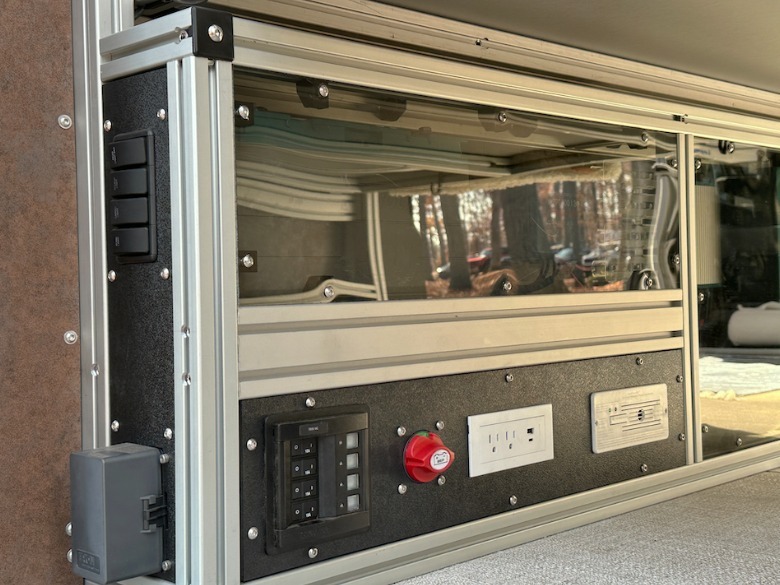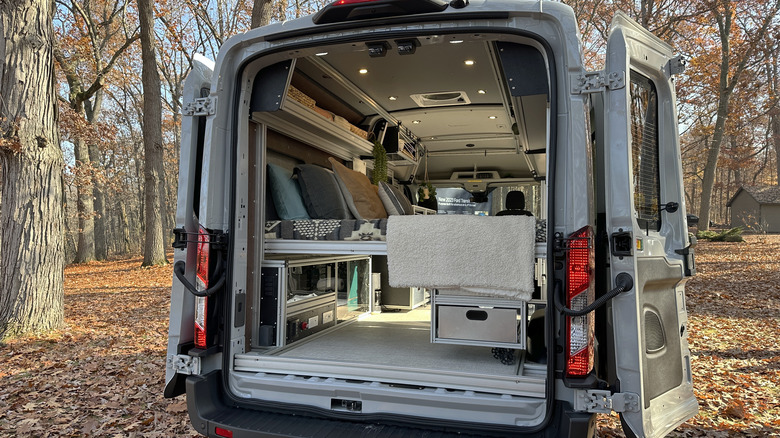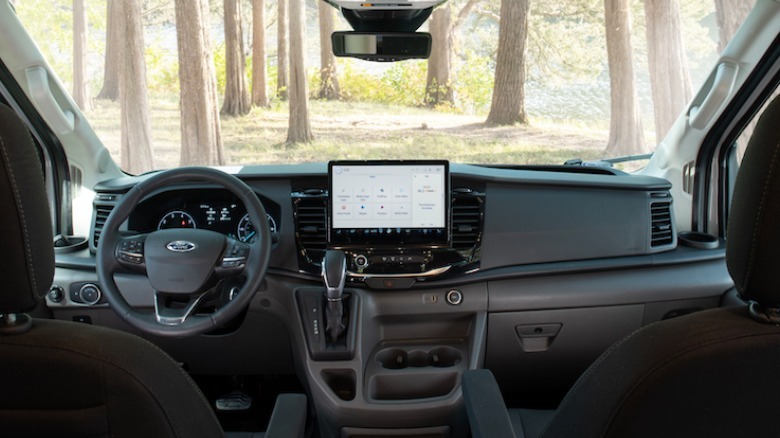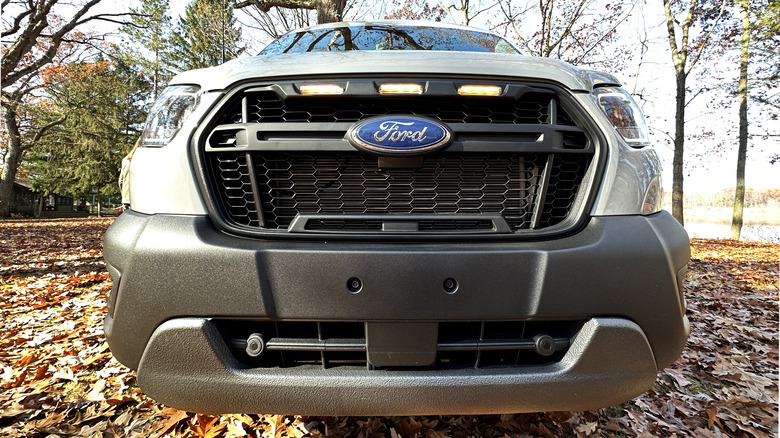2023 Ford Transit Trail Is An RV Blank Canvas For Embracing #VanLife
If you've spent any time on Instagram, TikTok, or Facebook during the past couple of years, you've probably seen the #VanLife hashtag pop up. RVs aren't new, but the pandemic, people increasingly working from home, and a desire to see more of the great outdoors (and preferably without a mask in the way) has boosted demand massively. While you might automatically think of huge, Class A behemoths, some of the biggest growth in the segment is actually Class B: smaller, more agile, and — importantly — far more affordable vans. That's just the market Ford is hoping to corner with its new 2023 Transit Trail.
As the name suggests, it's the familiar Transit van but given an out-of-the-factory upgrade to suit RV duty: whether you're building out your van yourself, or turning to a professional upfitter. From the outside, the lifted, ruggedized van looks just about close enough to a regular Transit to be stealthy, not to mention hide mud and dirt with a new palette of relatively subtle colors.
On the inside, though, it's Ford's vision of a blank canvas. Rather than banks of shelving for Amazon packages, drawers, and bins for worksite tools, or rows of seats for airport transfers, the Transit Trail leaves its capacious rear empty. What you see here is just one vision of what the end result might look like.
A blank canvas in three sizes
Ford is offering three configurations of Transit for the Transit Trail package: the 148-inch wheelbase in Medium or High Roof long length, or the High Roof extended length. For context, the van you see here is the Medium long length — the smallest version — and, at 5'8, my head was just brushing the roof when I stood up inside. Opt for the High Roof version and you're looking at headroom for a 6'5 person, while the biggest configuration has 487 cubic feet of cargo space to play with.
All get privacy glass for the sliding side door and the twin rear doors, plus Ford has marked out drivable areas for things like shelves and cabinetry, a bed, and other key components. A keyless entry pad and built-in inverter are standard, for a 110V/400W outlet and a 12-volt socket, along with a 4G LTE modem with WiFi hotspot support for up to 10 devices.
An optional Upfitter Package adds an exterior light bar, high-capacity up fitter switches, a larger center console, and an auxiliary fuse panel. It also includes dual AGM batteries and modifications to the vehicle wiring system. Just don't expect an old-school propane tank: Ford says it's not touching other fuel systems and points out that many upfitters feel the same way these days, automatically opting for electric.
The view up-front is familiar to anyone who has spent time in a Transit. SYNC 4 is standard on a 12-inch touchscreen, with navigation an option, and there's an overhead shelf and cloth manual seats that rotate 180 degrees to face the rear. Ford offers leather, 10-way power adjustable seats that don't have that swivel as an option. In all, it's a more comprehensive set of equipment than the Adventure Prep Package available on the 2022 Transit included.
Let the upfitting begin
Everything you see inside beyond the front seats here, meanwhile, is aftermarket work. In this case, Vandoit added a diminutive kitchen, fridge, bed, storage, and a lithium-ion battery system. In total, it's around $40-45k worth of upfit, though Ford points out that just how much you'll spend will come down to your desired creature comforts and how much work you're willing to do yourself: anything from a few thousand dollars through to six-figures of four-wheeled luxury.
DIYers are one of the biggest markets that Ford Pro sees for the Transit Trail, and in fact, that segment helped convince the number-crunchers on the whole project's financial viability. "They're willing to take the time to build the van to their specifications," Julie Ellenberger, Product Marketing Manager at Ford Pro, explains, for whom the idea of the automaker doing the "must-have, functional stuff; the scary stuff" so they can concentrate on the personalized elements is particularly appealing.
So, Ford adds the bigger, 30.5-inch all-terrain Goodyear Wrangler Workhorse tires — 2.5-inches bigger than the Transit's standard wheels, for a smoother, more planted ride even off-asphalt — and increases the track by 2.75-inches overall. It also lifts the body, for a total of 3.5-inches of lift overall, and it'll fit the roof vent fan so that new owners don't have to take an angle-grinder to their brand-new van.
Reassurance on the road
Importantly, it also means the Transit Trail's warranty — 3 year/36,000 miles bumper-to-bumper, and 5 years/60,000 miles for the powertrain, safety restrain system, and roadside assistance — remains, and the active driver assistance like blind-spot, side-sensing, and reverse warnings is tuned to suit the dimensions and other changes of the van. The new 16-inch black wheels, grille with marker lights, headlamps with LED surrounds, lower bumper, fixed side steps, lip moldings, and splash guards are all unique to Transit Trail, but they're also manufacturer parts.
That should make servicing far more straightforward compared to a van pieced together from third-party catalogs, and it's that aftercare story that Ford is particularly counting on to make the Transit Trail a hit. There are over 3,000 Ford dealers around the U.S., over 650 commercial vehicle centers, and more than 800 mobile service vans. While the automaker won't name names, it's blunt that rivals — which include Mercedes' Sprinter, Ram's ProMaster, and vans from GM — can't quite match its support network, and nor are they necessarily doing their own chassis modifications in the factory.
No electric Transit Trail - yet
There's a single drivetrain option, Ford's 3.5-liter EcoBoost V6 gas engine with 310 horsepower and 400 lb-ft of torque. It's paired with a 10-speed automatic transmission and permanent all-wheel drive — no manually selecting 4H or 4L here, as you would in an F-150 — with Normal, Eco, Mud/Ruts, Tow/Haul, and Slippery drive modes. The Heavy-Duty Trailer Package — with a 6,500 pound tow rating — is standard as well, complete with a tow hitch, and you can upgrade the standard 24 gallon gas tank to a 31 gallon version for more time between stops.
What you won't get, for now, is BlueCruise: Ford's hands-free highway assisted driving system isn't available on Transit yet, which is a shame as it would definitely be a boon on long road-trips. Adaptive cruise control with lane-keeping — though not active lane centering — is standard, however.
Nor is there an electrified Transit Trail. While a plug-in hybrid would have obvious advantages — not least a bigger onboard battery that could be used to power cabin equipment — Ford says it's not under consideration. The automaker is looking at all-electric for the future, but the current eTransit lacks all-wheel drive and towing capacity, and the Transit Trail team isn't convinced by its maximum 126 mile range either.
Limited supplies but no single customer
DIY "vanlife" enthusiasts won't be the only audience here, of course. Ford says it's already seeing tremendous interest from professional upfitters — it keeps a database of them for people looking for a local specialist — and in fact, one company apparently tried to buy up all of the Transit Trail in the first year of production. Ford Pro gently let them down.
That's because it wants to make sure there are vans to go around, regardless of whether you want one ready off the upfitter's lot, or if you want to go the DIY route. Volumes will be limited — Ford won't say just how many it's making — and it'll be splitting the channel for DIY and upfitter customers. Later, it's expecting to court commercial users, seeing the potential for the van on worksites, at forest services, and similar.
The DIY audience is likely to be "substantial" Ford predicts, but it's fair to assume that demand will outstrip supply — even with the 2023 Transit Trail's $65,975 (plus destination) sticker price before modifications. Over time, you'll be able to order directly through RV dealers, but for now, the order books open from today, and the first deliveries are expected from Spring 2023.
